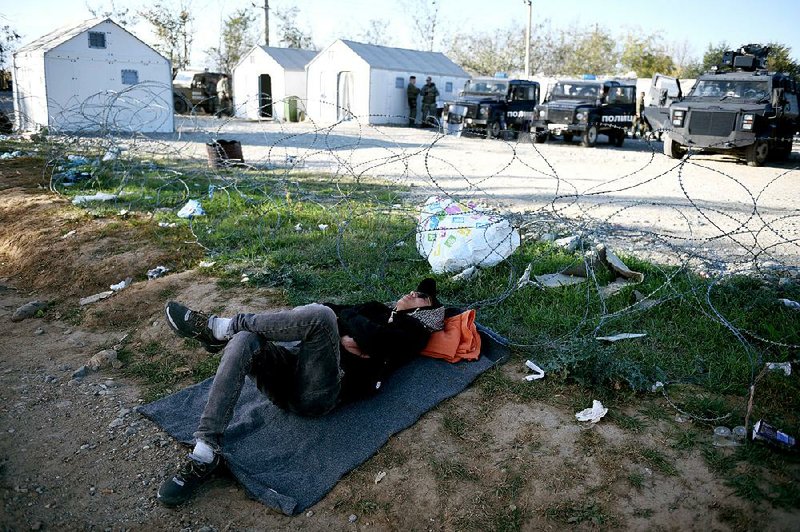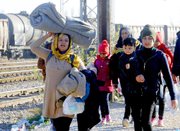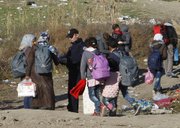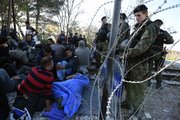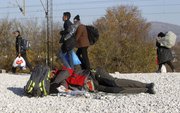BELGRADE, Serbia -- Most nations along Europe's refugee corridor shut their borders Thursday to those not arriving from war-torn countries such as Syria, Afghanistan or Iraq, leaving thousands of migrants stranded at Balkan border crossings.
The overnight decision triggered the domino effect that asylum seekers and European nations had feared, given the number of people fleeing to Europe this year, and reflected new worries about militants infiltrating the flood of refugees.
Macedonia, Serbia, Croatia and Slovenia weren't allowing in so-called economic migrants whose countries aren't shattered by war. To cross the border, asylum seekers had to display identity documents proving that they were from Syria, Afghanistan or Iraq. Many of the migrants could not product those documents, even if they were from those nations.
"We're extremely worried about the latest developments and fear that people will be stranded without any assistance, shelter and food just as winter sets in," said Stephane Moissaing, head of the Doctors Without Borders in Serbia.
"It is not acceptable that people who want to seek asylum are being segregated by nationalities," Moissaing said. "The right to ask for asylum is universal and cannot be connected to certain nationalities."
In the Greek village of Idomeni at the border with Macedonia, police said the border was essentially shut down to all since Thursday morning. Some 3,000 people were waiting at a camp nearby that provides temporary shelter for those heading north through the Balkans.
About 500 people from Iran, Morocco and Algeria gathered at the border between Greece and Macedonia to protest the closure. As a result, nobody from the nationalities that Macedonia was letting through -- Syrians, Afghans or Iraqis -- was allowed to cross.
Dariush Yazdani, 25, from Tehran, said he was determined to reach Germany and faces imprisonment if he returns to Iran.
"I will never go back," he said.
Mohammed Mirzam, a 30-year-old from Afghanistan, knew that he could go across, but his wife and two children, Ilia, 5, and Elena, 3, are Iranians who would be blocked.
"We're trapped," he said from the Greek side of the border at Idomeni. "They won't let my family across. We have no money, and we're waiting without any idea of what is to happen."
At the Serbian border with Macedonia, the Serbs were letting in only migrants from Syria, Afghanistan and Iraq. And at the Croatia-Serbia border, Croats were accepting only people from those three countries plus Palestinians.
Slovenia -- the next country in the chain -- said it also has been turning back economic migrants.
"This is going to be definitely a challenging situation," said Melita Sunjic, U.N. refugee agency spokesman in Serbia. "UNHCR does not think that there is any nation that can be excluded from international protection. ... Each case individually should be screened."
Although Syrians are the biggest group among the asylum seekers, tens of thousands of people fleeing poverty -- such as Pakistanis, Bangladeshis or Sri Lankans -- also have joined the surge.
Serbian Labor Minister Aleksandar Vulin blamed European Union members Slovenia and Croatia for the ban, saying they have started turning back people who are fleeing poverty, not war.
"We have to protect our country. That is why we have applied reciprocal measures toward the people Slovenia and Croatia have no room for," Vulin said.
Slovenia's decision to start turning back economic migrants triggered the chain reaction along the Balkan migrant route.
"These foreigners do not qualify for international protection," said Slovenian police spokesman Drago Menegalia.
Slovenian officials say they will continue to allow refugees from Syria, Afghanistan and Iraq to pass through on their way to Austria and other richer EU nations.
Tension along the migrant corridor has risen since the attacks in Paris that left 129 people dead. Migrants voiced sympathy for the victims of the Paris attacks, and said they hope that European nations won't let fear of extremists change their societies.
They also joined calls for Europe to make a better effort to weed out extremists within the refugee ranks, so that the door is left open to the innocent migrants who are in need of help.
For Ferhad Nezdevan, a 29-year-old Syrian, the Paris attacks cast a cloud of suspicion over all those seeking refuge in Europe.
"It's a problem for us," Nezdevan said at the Slovenian-Austrian border. "In Syria there is war. Here there is war."
Nezdevan left his home because of violence against his family by the Islamic State, which controls large areas of Syria and Iraq.
Mistrust of refugees streaming into Europe has grown since a Syrian passport, registered in countries along the migrant route, was found next to the body of one of the Paris attackers. Officials have appealed that people not reach hasty conclusions as a result.
European security officials and the Frontex border agency have consistently said they see no evidence of extremists traveling among refugees. Militants, they argue, are more likely to arrive through Europe's airports with good paperwork than take the risk of a difficult and dangerous journey by sea and overland.
Information for this article was contributed by Elena Becatoros, Costas Kantouris and Jovana Gec of The Associated Press.
A Section on 11/20/2015

